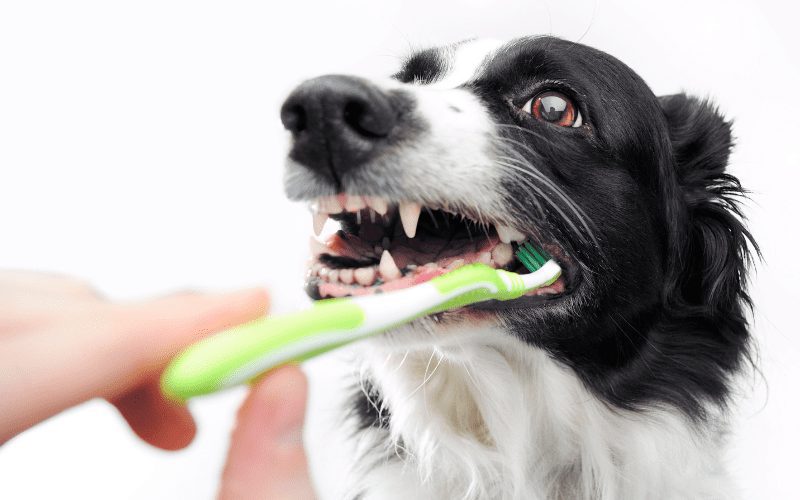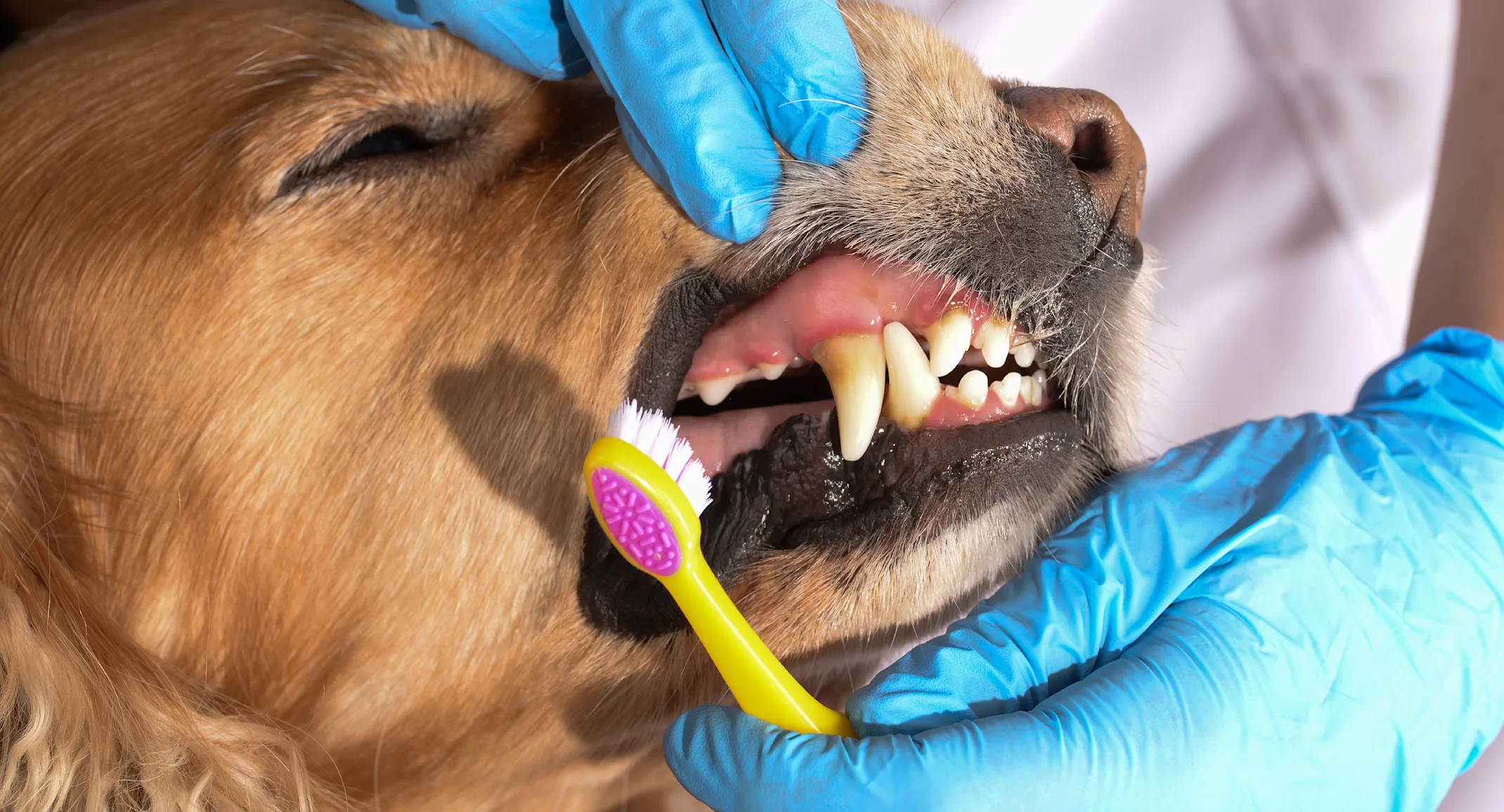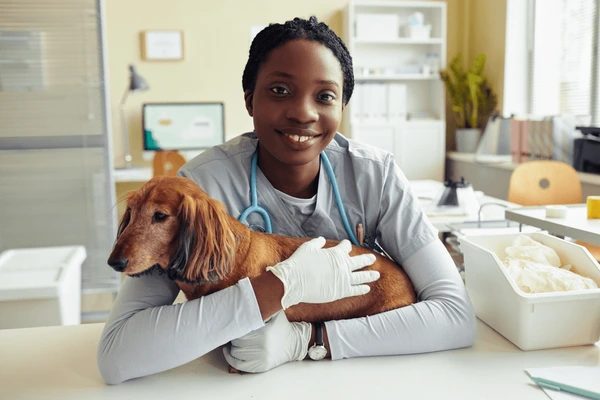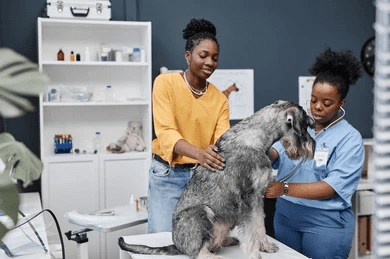
Pet Dental Care Made Simple: 9 Ways to Keep Your Pet’s Mouth Healthy and Pain-Free
When we think of our pets’ health, we often focus on vaccines, diet, or grooming — but what about their teeth and gums?
Many pet owners don’t realize that dental care is one of the most overlooked yet essential parts of pet wellness.
At BlueBlood Veterinary, we’ve seen firsthand how dental neglect can lead to infections, heart problems, and chronic pain. The good news? Most of it is preventable with simple, consistent care.
In this guide, we’ll explain why dental hygiene matters, how to spot warning signs, and what you can do at home — and with our team — to keep your pet’s smile bright and healthy.
1. Why Dental Health Matters for Pets
Dental disease affects over 80% of dogs and 70% of cats by age three. But it’s more than just bad breath.
Here’s why oral care should be part of every wellness plan:
-
Prevents pain and infection: Untreated plaque and tartar lead to gingivitis, tooth loss, and jaw bone damage.
-
Protects overall health: Oral bacteria can enter the bloodstream, affecting the heart, liver, and kidneys.
-
Improves quality of life: Pain-free pets eat better, play more, and live happier lives.
At BlueBlood Vet, we treat every pet’s dental health as part of their whole-body wellness — not just a cosmetic issue.
2. Understanding Common Dental Problems in Pets
| Dental Problem | Description | Symptoms | Treatment |
|---|---|---|---|
| Plaque & Tartar | Buildup of food debris & bacteria on teeth | Yellow/brown teeth, bad breath | Scaling & polishing |
| Gingivitis | Inflammation of gums | Red, swollen gums, bleeding | Professional cleaning |
| Periodontal Disease | Infection spreading below gum line | Loose teeth, pain, drooling | Deep cleaning, antibiotics |
| Tooth Abscess | Infection in tooth root | Swelling, pain, loss of appetite | Extraction or surgery |
| Broken Teeth | Often caused by chewing hard objects | Sensitivity, bleeding | Repair or removal |
If your pet exhibits any of these, it’s time to book a dental exam at BlueBlood Veterinary.
3. Signs Your Pet May Have Dental Disease
Your pet can’t say, “My tooth hurts.”
But you can look out for these warning signs:
-
Persistent bad breath
-
Difficulty eating or chewing
-
Drooling or pawing at the mouth
-
Bleeding or receding gums
-
Loose, missing, or discolored teeth
-
Swelling around the face or muzzle
-
Behavioral changes — irritability, hiding, or reluctance to play
The earlier we detect these symptoms, the easier (and cheaper) the treatment will be.
4. What Happens During a Professional Dental Cleaning at BlueBlood Vet
Our dental cleanings are safe, thorough, and performed under veterinary supervision.
Step 1: Pre-Exam
We begin with a full physical and oral exam to assess your pet’s health and anesthetic readiness.
Step 2: Anesthesia & Monitoring
General anesthesia ensures your pet’s comfort and allows our team to clean below the gum line — where 60% of disease hides.
Step 3: Scaling & Polishing
Using ultrasonic tools, we remove plaque and tartar, then polish the teeth to slow future buildup.
Step 4: Examination & Treatment
We check for hidden infections, loose teeth, or gum damage and treat them on the spot.
Step 5: Post-Care & Home Plan
You’ll receive personalized advice for brushing, diet, and at-home dental care.
Our focus is always on comfort, safety, and long-term health.
5. Brushing Your Pet’s Teeth at Home
Daily brushing is the gold standard of dental care — and yes, it’s possible!
How to start:
- Use a pet-specific toothbrush or soft finger brush.
- Choose veterinary toothpaste (never human — fluoride is toxic to pets).
- Start slowly, letting your pet lick the toothpaste first.
- Brush small circular motions along the gum line for 30 seconds per side.
- Reward with praise or treats afterward.
Even brushing 3–4 times per week can significantly reduce plaque buildup.

6. Dental Diets, Chews & Treats
If brushing isn’t always possible, there are effective alternatives:
-
Dental chews: Help scrape away plaque while satisfying chewing instincts.
-
Special dental diets: Designed with texture and ingredients that reduce tartar.
-
Additives: Water or food additives can help control oral bacteria.
Ask our veterinarians about approved brands — some over-the-counter products are ineffective or unsafe.
7. The Connection Between Dental Disease & Organ Health
Dental disease doesn’t stay in the mouth.
When bacteria from infected gums enter the bloodstream, they can damage internal organs — especially the heart, liver, and kidneys.
This condition, known as bacteremia, can lead to chronic illness over time.
That’s why we emphasize preventive dental care at every BlueBlood Vet check-up. Healthy teeth mean a healthy body.
8. Myths About Pet Dental Care — Busted!
❌ “My pet eats dry food, so their teeth clean themselves.”
Truth: Kibble helps a little, but it doesn’t replace brushing or professional cleaning.
❌ “Bad breath is normal for pets.”
Truth: Persistent odor means bacteria — it’s never “normal.”
❌ “Anesthesia-free cleaning is safer.”
Truth: It may look appealing, but it only cleans the surface and misses hidden infection under gums — risking long-term damage.
❌ “Puppies and kittens don’t need dental care.”
Truth: Early habits prevent disease later. Start brushing when they’re young.
9. How Often Should Your Pet’s Teeth Be Cleaned?
-
At-home brushing: Daily or at least 3 times weekly.
-
Vet check-up: Every 6–12 months.
-
Professional cleaning: Once a year (or more often for small breeds, seniors, or pets with prior dental issues).
BlueBlood Vet provides reminder systems so your pet never misses a cleaning or check-up.
10. Dental Care for Senior Pets
Older pets are especially prone to dental problems — and they feel pain just like younger ones.
Our team uses gentle anesthesia protocols and thorough monitoring to ensure safety during procedures.
Pain relief and post-dental care are carefully managed to keep your senior pet comfortable and healthy.
11. FAQs — Pet Dental Care
Q1: Is it really necessary to brush my pet’s teeth every day?
Yes. Daily brushing removes plaque before it hardens into tartar, saving your pet from pain and costly treatments.
Q2: My pet hates brushing — what can I do?
Try flavored toothpaste, positive reinforcement, and short sessions. You can also use dental chews or wipes between brushings.
Q3: How do I know if my pet’s teeth need professional cleaning?
If you notice bad breath, discoloration, or red gums — it’s time to book a cleaning.
Q4: Can dental disease be reversed?
Early stages like gingivitis can be reversed, but advanced periodontal disease requires professional treatment.
Q5: Is anesthesia safe for dental cleanings?
Absolutely — modern anesthesia is extremely safe when administered by skilled professionals like those at BlueBlood Vet.
Q6: What age should dental care start?
As early as 6 months. Getting young pets used to brushing prevents future fear and discomfort.
12. BlueBlood Veterinary’s Commitment to Healthier Smiles
At BlueBlood Veterinary, dental care is a cornerstone of our holistic approach.
We don’t just clean teeth — we protect lives. Every dental procedure we perform is guided by our values of Humanity, Patience, Professionalism, Resourcefulness, and Friendship.
Your pet’s comfort and safety are our top priorities, and we make every visit a positive experience.
🐾 Book your pet’s dental check-up today and give them the gift of a pain-free smile that lasts a lifetime.















